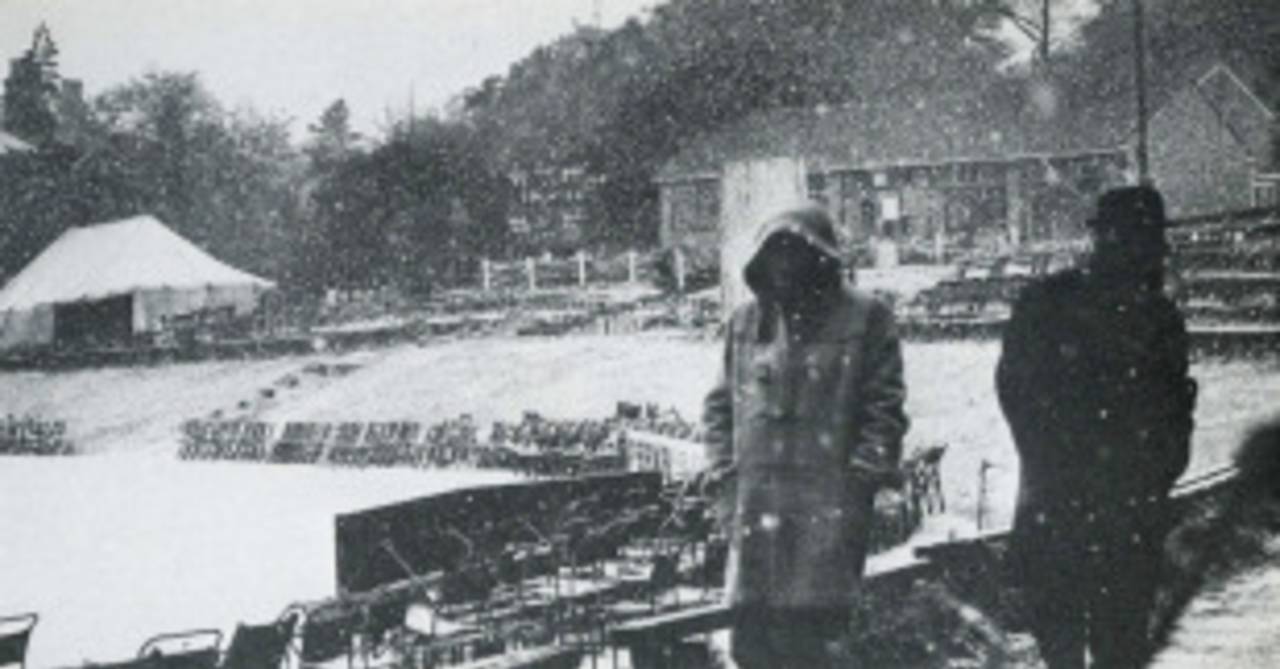While the summer of 1976 has gone down in folklore as the hottest since records began in Britain, what is largely forgotten is that the previous year was almost as hot, with averages temperatures breaking all records. The inaugural World Cup, held during the second and third weeks of June, took place in permanent sunshine. And yet in the week before the opening matches, there was every reason to fear the British weather would tarnish the tournament.
After a warm weekend, the Monday dawned with a bitter wind sweeping across the country. As counties arrived to resume their Championship matches, the prospects of play seemed slight.
The most remarkable events came at Buxton - England's highest town - where
Derbyshire were playing Lancashire. What ought to have been an ordinary and low-key day made the front pages of many of the following morning's newspapers.
On the Saturday, Lancashire had raced to 477 for 5 - a big score now, an almost unbelievable one by the standards of the day - before reducing the home side to 25 for 2 by the close. A large crowd, many shirtless, ate ice-cream and sheltered from the fierce sunshine.
Shortly after the teams and umpires arrived at Buxton on the Monday, it started to rain. Within minutes rain had turned to hail and then snow. After a few minutes the ground resembled a Christmas card.
It was almost inevitable one of the umpires was Dickie Bird. "When I went out to inspect the wicket, the snow was level with the top of my boots. I'd never seen anything like it," he recalled. Play was abandoned immediately.
Clive Lloyd, who had hit a big hundred for Lancashire two days earlier, was equally bemused, but that did not stop him scooping up and handful of snow and hurling it at the county's Indian wicketkeeper, Farokh Engineer.
Bob Taylor, the Derbyshire and England wicketkeeper, and team-mates Geoff Miller and Keith Stevenson, ambled to the bowling club next door to see what was happening there. An attempt to play a game ended within minutes when the bowls gathered snow as soon as they had been played.
There was also snow at Colchester but Essex and Kent managed two hours of cricket in wretchedly cold conditions.
At Buxton, the teams returned on the Tuesday and Derbyshire were horrified to be told by Bird that play could start on time. "It were a lovely day," he said. "Don't forget, we had uncovered pitches in those days." While the pitch looked just about fit, it was actually rock hard under a damp skin. Within two overs it was clear to all the day was about self preservation as the ball lifted and seamed viciously and totally unpredictably. "It was a vicious, drying pitch," lamented the Derbyshire yearbook. "No side on earth could have survived against a fast attack and a rearing ball."
Derbyshire were bowled out for 42 in a little over an hour, although they were a man light as 18-year-old Mick Glen was absent with a stomach upset.
There was a rather surreal moment when Ashley Harvey-Walker was batting and his turn came to face seamer Peter Lee. "He took out his false teeth, wrapped them in a handkerchief and asked me to look after them," Bird recalled. "He said not to worry because he wouldn't be in for long. I'm glad to say he collected his teeth three balls later."
Following-on, Derbyshire fared little better, making 87 to crash to their heaviest defeat of the century - an innings and 348 runs. Fast bowler Peter Lever, who earlier in the year had been involved in the incident where New Zealand's No. 11 almost died when struck by a bouncer from him - was reluctant to bowl and did not come on until Derbyshire were 60 for 3. Despite refusing to bowl at anything more than medium pace he took 5 for 12 in 22 deliveries. The game was finished by 3.20pm.
Exactly a week later the Daily Mail sent a reporter back to Buxton to find a different scene - the temperature had soared from 36 degrees to 75 degrees and "spectators stripped to the waist in the sunshine".
Two months later, after weeks of unbroken sunshine, the fourth day of the second Test between England and Australia set a new record for the hottest day at a Lord's Test, as the thermometer reached 93 degrees. It was also notable for the famous streaker.
Is there an incident from the past you would like to know more about? Email us with your comments and suggestions.
Martin Williamson is executive editor of Cricinfo and managing editor of ESPN Digital Media in Europe, the Middle East and Africa
